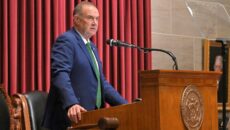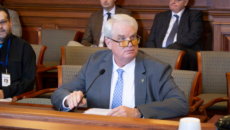JEFFERSON CITY, Mo. — Multiple state agencies are geared up to undergo significant changes as Missouri’s chief executive looks for ways to improve economic and workforce development.
On Thursday, Gov. Mike Parson signed three executive orders that initiate the process of restructuring four state agencies — the Department of Economic Development, the Department of Higher Education, the Department of Natural Resources, and the Department of Insurance, Financial Institutions, and Professional Registration.
The changes are being touted as a “complete overhaul of Missouri’s economic development strategy.”
Executive Order 19-01 transfers the Division of Energy from the Department of Economic Development to the Department of Natural Resources.
Executive Order 19-02 transfers the Office of Public Counsel and the Public Service Commission from the Department of Economic Development to the Department of Insurance, Financial Institutions, and Professional Registration. That department will actually be renamed to the Department of Commerce and Insurance.
Executive Order 19-03 transfers the Division of Workforce Development and the Missouri Economic Research Information Center from the Department of Economic Development to the Department of Higher Education. The order reorganizes the structure of the Department of Economic Development.
In a press conference, it was noted that the changes come after months of research which showed that Missouri lags behind its peers in nearly every economic development measure.
“When you look at our economy, you see a lot of good things — low unemployment, job growth, wage growth,” Parson said. “But when you look at what’s happening in our neighboring states, you see that we could be doing a lot better. We believe these changes will move Missouri forward. This is how we become the best in the Midwest.”
“We looked at everything from the number of jobs that we help create to our workforce training program results, to macro-level measures like GDP growth and labor productivity,” Department of Economic Development Director Rob Dixon said. “What we found was that our numbers are trending positive, but we’re not seeing anywhere near the growth that our competitor states are.”
The research conducted, combined with feedback gathered from nearly 4,000 Missourians across the state, helped shape the final changes issued in today’s executive orders, said Parson.
The most significant changes are to the Department of Economic Development. In total that agency will be reduced from roughly 800 employees to 165.
The research found that the Missouri Department of Economic Development has more employees and houses more functions than any of its peer agencies. Only 4 percent of Missouri’s staff is directly engaging with business. Comparatively, other economic development agencies in the Midwest average 31 percent.
By and large, those states tended to outperform Missouri in terms of job creation and capital investment. That factor played a role in the restructuring process.
“All of the research and the feedback gathered pointed toward a few key principles,” said Dixon. “Our organization wasn’t built around our customers; we have one size fits none approach to the different regions of our state, and all of this has resulted in an organization that lacks focus and doesn’t perform as well as we should.”
The executive orders call for the creation of a new division that will be solely dedicated to connecting businesses with skilled workers and a new division that will dedicate more resources to business development statewide.
During expansions and relocations, when businesses need to ramp up quickly and handle large numbers of job applicants, Missouri One Start will work with community and technical colleges to help market job openings, recruit, and train workers.
The Regional Engagement Division will reassign existing staff to dedicate more resources to business development statewide. The teams that form this division will be located in the regions they serve and will be a primary point of contact for businesses and communities looking to interact with state government on economic development needs.
“This is truly a watershed moment for the department,” Dixon said. “We’re shifting our culture to be completely oriented around the customer and the communities we serve, and Missouri will have an economic development agency built for the 21st century.”
The Department of Economic Development will also be reduced significantly in size with several divisions and employees moving to different agencies.
“The fact is that some of the functions currently within the Department of Economic Development are more closely related and better suited for other agencies,” Dixon said.
Roughly 344 employees will be moving to the Department of Higher Education. The Division of Workforce Development and the Missouri Economic Research Information Center will be making the move, too.
“This change gives Missourians one resource for the full range of postsecondary options – from apprenticeships to certificates to doctoral programs,” Commissioner of Higher Education Zora Mulligan said. “It will position Missouri as a national leader in workforce development.”
Roughly 38 employees will be moving to the Department of Natural Resources. The entire Division of Energy will now be under that state agency.
“We are excited to welcome the Division of Energy back to the Department of Natural Resources,” said Carol Comer, Director of the Department of Natural Resources. “We look forward to hitting the ground running by focusing our efforts on an affordable and reliable energy strategy for the State of Missouri.”
Roughly 200 employees will be moving to the newly-renamed Department of Commerce and Insurance. The Public Service Commission and Office of Public Counsel will be making the move.
“We are pleased to welcome our colleagues in the Public Service Commission and the Office of Public Counsel to our department,” Chlora Lindley-Myers, Director, Missouri Department of Commerce and Insurance said. “While our names may be changing, our mission remains the same – to regulate the industry to ensure a safe and competitive market and to protect Missouri citizens.”
The changes made through executive order are also spelled out in Parson’s FY 2020 budget recommendations and will take effect 60 days from the date the order was issued.
















